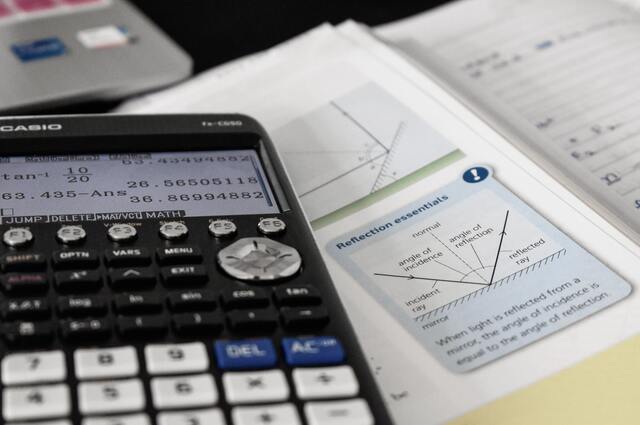
In regard to the ATAR calculation, the VCE score is a part of it. Students have to be taking a minimum number of subjects that can be used in the calculation, including VCE maths subject. There are 5 maths subjects available at the VCE level, but only 3 of them are offered in Year 12.
Those 5 maths subjects are Foundation Mathematics (Units 1 and 2), General Mathematics (Units 1 and 2), Further Mathematics (Units 3 and 4), Mathematical Methods (Units 1-4), and Specialist Mathematics (Units 1-4).
Maths becomes one of the most general subjects that is taken for VCE. If this is a matter that you are concerned about, this is a piece of information you just need to make a decision and select the subject offered at Year 12 that is suitable for you.
This maths subject is the most popular of all VCE mathematics. Sometimes it is also considered the easiest subject in Year 12. The goal of this subject is to make mathematics approachable to a wide range of students.
All of the topics are not calculus-based, and they are created to serve as broad preparation for work or additional mathematical study, particularly where data analysis, financial math, and number patterns are significant.
You must possess some presumptive knowledge from General Mathematics Units 1 and 2 in order to succeed in this topic. Having said so, a learner may move from Mathematical Methods units 1 and 2 into Further 3 and 4. To make sure you are familiar with all of the pertinent material, you will need to do some more research.
Many people have the idea that Further Mathematics is simple. Even though the material may be easier to understand than Methods or Specialist, it is nonetheless a tough subject. One that if you want to get a score in the mid-40s takes a very high degree of commitment, focus, and consistency.
This subject is the second most popular VCE Maths subject, with over 15,000 students enrolling in the course each year. Calculus - both differential and integral - is the main topic of this subject.
Algebra, probability, statistics, and functions are the remaining courses. These topics are utilized in a variety of theoretical and real-world settings. They also provide a foundation for future study in a variety of subjects, including the humanities, sciences, business, and medicine.
In contrast to Further Mathematics, there is a non-calculator component that accounts for about 50% of your final score. Therefore, if you are not sure about your ability of mental computation, this is not the subject for you. You must be able to pass our test of multiplication speed with a great score. Try it out to see if you have what it takes. Anyone exploring Mathematical Methods should have this skill.
Mathematical Methods is the course for you if you enjoy math, are comfortable with computation, want to learn more about it, or if you probably need it as a prerequisite for a tertiary course like engineering or medicine. A score of 35 will probably be upped to 40.
In year 11, a lot of students enroll in Methods with the mistaken impression that it will be a "simple" route to earn a high ATAR. You should instead take up the subject if you are sincerely interested in mathematics.
Of all the VCE maths subjects, this one is both the most challenging and least well-liked. As a result of its reputation for scaling up your raw score by a staggering 9–12 points, it draws high-achieving students. Many math and science enthusiasts find that Specialist Mathematics is simpler to understand than Mathematical Methods.
This subject is intended to be taken along with or after Mathematical Methods Units 3 and 4. The foundation for the Specialist Mathematics program is laid here. The design of the content assumes that the students have a basic familiarity with Mathematical Methods.
Many of the subjects covered in Methods are also covered in Specialist Math, however at a higher level of complexity. Along with this, more complicated mathematical topics like complex numbers, vectors, differential equations, physics, and statistical inference are also covered.
Functions and graphs, algebra, calculus, vectors, mechanics, and probability and statistics are covered in Specialist Mathematics Units 1 through 4. It has a calculator and non-calculator component and must be studied after or along with Mathematical Methods Units 3 and 4.
If you wish to go beyond the material in Methods and understand more sophisticated concepts like differential equations, complex numbers, physics, and statistical inference, Specialist Mathematics is the subject that you need.
In the end, you must be prepared to put in the additional practice time necessary to excel in Specialist Mathematics. There will be new ideas to pick up from the beginning, but if you have a genuine interest in mathematics, you will not only appreciate it, but you will also do it well.
The mathematics subjects for the VCE can be fairly challenging for students to understand because of how complicated maths can be. However, now that you are more knowledgeable about the various maths subjects available, you may confidently choose the one that best suits your needs. Here are things you should take into account when choosing the right one for you.
The next thing you need to do after reading this is trying to answer the question list. Once you have all questions answered, you will get to know the maths subjects you have to take. Is it Further, Methods, or Specialist Mathematics? Good luck!